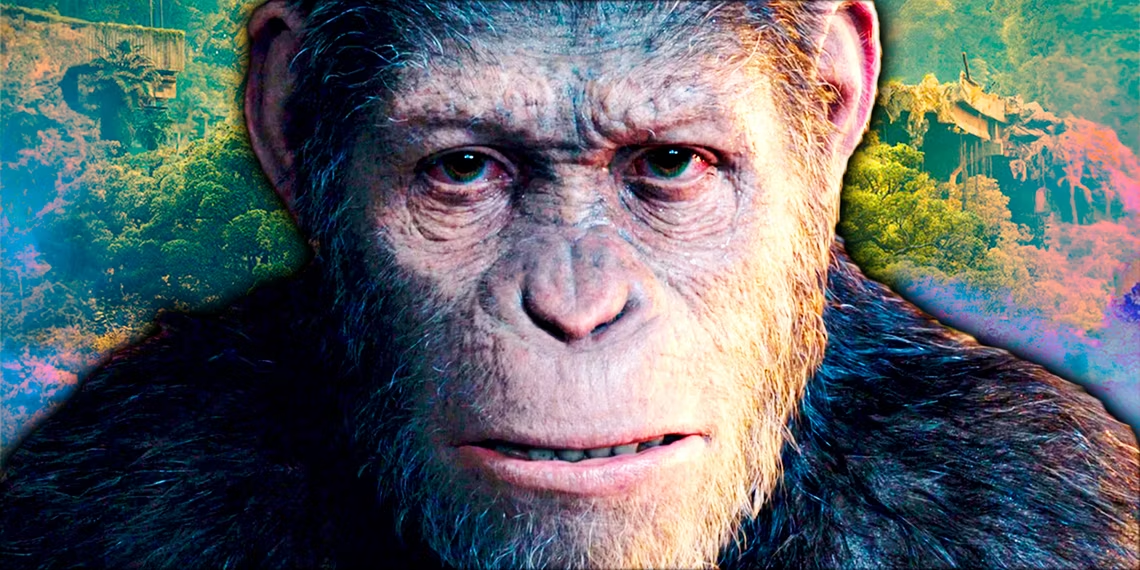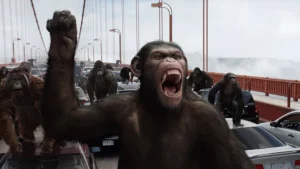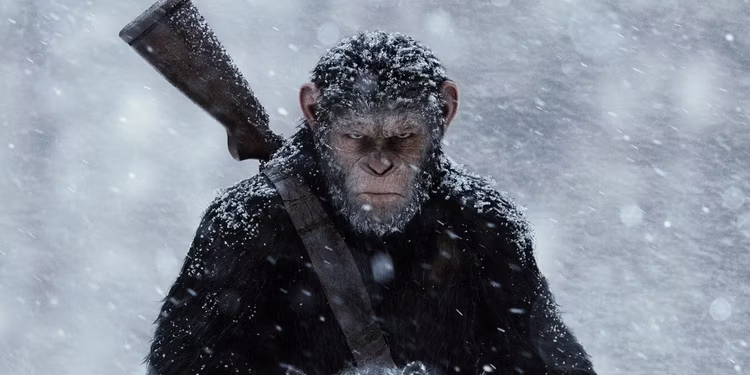Caesar, who appears in two distinct timelines as a messianic primate, is a pivotal character in the Planet of the Apes film series.

Caesar, a chimpanzee, serves as the leader of the titular primates in both of the Planet of the Apes primary timelines. Caesar, a messiah in ape civilization, is crucial to the transformation of the earth into an ape planet. Due to his contacts with humans, he is not only a leader of his kind but also a person who is morally torn.
Caesar is essential to preserving any semblance of harmony between humans and apes, either in spite of or possibly because of his past. Though his last destiny was tragic, he unavoidably guided his people to the promised land, just like the ancient Moses. His influence can still be felt in the future Kingdom of the Planet of the Apes, despite the fact that it makes fun of the apes’ heritage.
In the original Planet of the Apes series, who was Caesar?
Though he wasn’t given that name in the film, Caesar had his screen debut in Escape from the Planet of the Apes. He was the offspring of two highly evolved apes named Cornelius and Zira, who had been sent back in time to Earth in the 1970s after the destruction of their future Earth, where apes predominated over feral, silent humans. When the truth about their destiny was uncovered, his parents were slain, but their son Milo—who had been exchanged at a circus with a regular chimpanzee newborn—lived. Though he made sure to keep this a secret, Armando, the generous owner of the circus, reared him and taught him how to talk and read. Over the next few years, a plague from space eliminated all dogs and cats, and humanity perished deciding to keep simian apes as pets. These primates eventually developed greater intelligence and used these abilities to transform themselves into a class of slaves.

Caesar incited an ape rebellion stir Conquest of the Planet of the Apes after discovering the reality of life beyond the circus and after Armando’s death. Though this sequence of events also gave him his true name when he was forced to chose from a book and pointed to the name Caesar, his developing hatred and rage against humanity was mostly fueled by their torment. This spread widely, and as human civilization fell apart, Caesar’s armies seized control. Caesar’s apes kept a large number of the nearby human survivors in cages. But eventually, they banded together to fight an increasing number of mutated people who had been deformed as a result of exposure to radioactivity and nuclear weapons.
Caesar was persuaded to attempt peaceful coexistence between humans and apes by McDonald, one of his human allies. This seemed to work, as Caesar, in spite of his treatment by other people, was never really a harsh person. As a result, youngsters from ape and human cultures coexisted and shared education in the future. The statue of the ape Lawgiver wept in the series’ iconic finale, implying that either Caesar’s attempts at coexistence were unsuccessful despite all difficulties or that he was in excruciating pain that this peace had ended.
Caesar, in the revived Planet of the Apes, was an Ape Messiah.
A few years after Tim Burton’s unsatisfactory reboot, Planet of the Apes was revived in a new series that relied more on computer graphics than traditional costuming to bring the apes to life. Starting with Rise of the Planet of the Apes, which is essentially a loose retelling of Conquest of the Planet of the Apes, these began. A female chimpanzee named Bright Eyes gets exposed to ALZ-112, an experimental medication intended to treat Alzheimer’s in people, in the rebooted universe. This makes her extraordinarily brilliant, and her newborn son demonstrates these same qualities after her death. Will Rodman, a researcher who is comparable to Armando in the classic series, takes in the juvenile chimpanzee. Will and his dementia-ridden Caesar is the name his father gave him.

Regretfully, Will is eventually had to part from Caesar with a chimpanzee and other ape centre. He faces out against opponents like Rocket there, but he stands up for himself and even picks up some language, yelling “no!” at a controlling carer. After that, he makes a quick getaway from the reserve and goes back to Will’s house, where he manages to obtain the more potent ALZ-113. After exposing himself and the other apes, along with others housed in zoos throughout the city, he ultimately spearheads an animal insurrection against humans. Caesar and the others flee to the forest after a bloody altercation on the Golden Gate Bridge, where Will greets them and bids them farewell.
Will’s neighbour, Patient Zero, takes a flight, which unfortunately causes the ALZ-113 to have a negative impact on humanity and soon spread over the world. The “Simian Flu” pandemic that results from this eventually wipes out at least half of the human race. Caesar and his gang in Dawn of the Planet of the Apes think that humanity is nearly extinct, but they are proven wrong when they come upon some people attempting to resurrect a nearby station. With more mistreatment than any other ape of his type, Koba is a vicious anti-human and causes a gap between Caesar and his newfound pals. Caesar doesn’t realise he’s failed until after being duped by him and coming dangerously close to being killed to recognise his own apes’ shortcomings and defects.
In Kingdom of the Planet of the Apes, the Legend of Caesar endures.

Kingdom of the Planet of the Apes is the long-awaited sequel to War for the Planet of the Apes, though it’s far removed from the events of Caesar’s life. The movie takes place 300 years after the previous movie, though Caesar’s legacy is still present in a dark, twisted way. The protagonist of the movie is Noa, a chimpanzee who many fans initially believed to be an older version of Caesar’s son Cornelius, until the movie’s plot elements were confirmed. In Noa’s time, ape society has come a long way, and it in many ways resembles the paradise that Caeasar led his group to right before he died. Unfortunately, not all is right with the world, namely due to an ape named after the former chimpanzee messiah.
Proximus Caesar, the movie’s antagonist, launches attacks on any other ape tribe that gets in the way of his despotic plans. Taking Caesar’s moniker, he subverts the ideals of the elderly ape to further his own agenda, which involves pursuing humans. This indicates that even though Caesar passed away centuries ago, he is still very much alive and well in ape society. Additionally, the passage of time produced a setting where people have long since forgotten Caesar’s relative neutrality towards humanity. Because of the virus, humans have fully regressed to a primitive state, and apes now openly oppress them. This suggests, in many respects, that Caesar’s dream of cohabitation in the original series was never intended to materialise. Even though circumstances The monkey who started it all was also the one person who momentarily kept things together, even if it all ended horribly.
